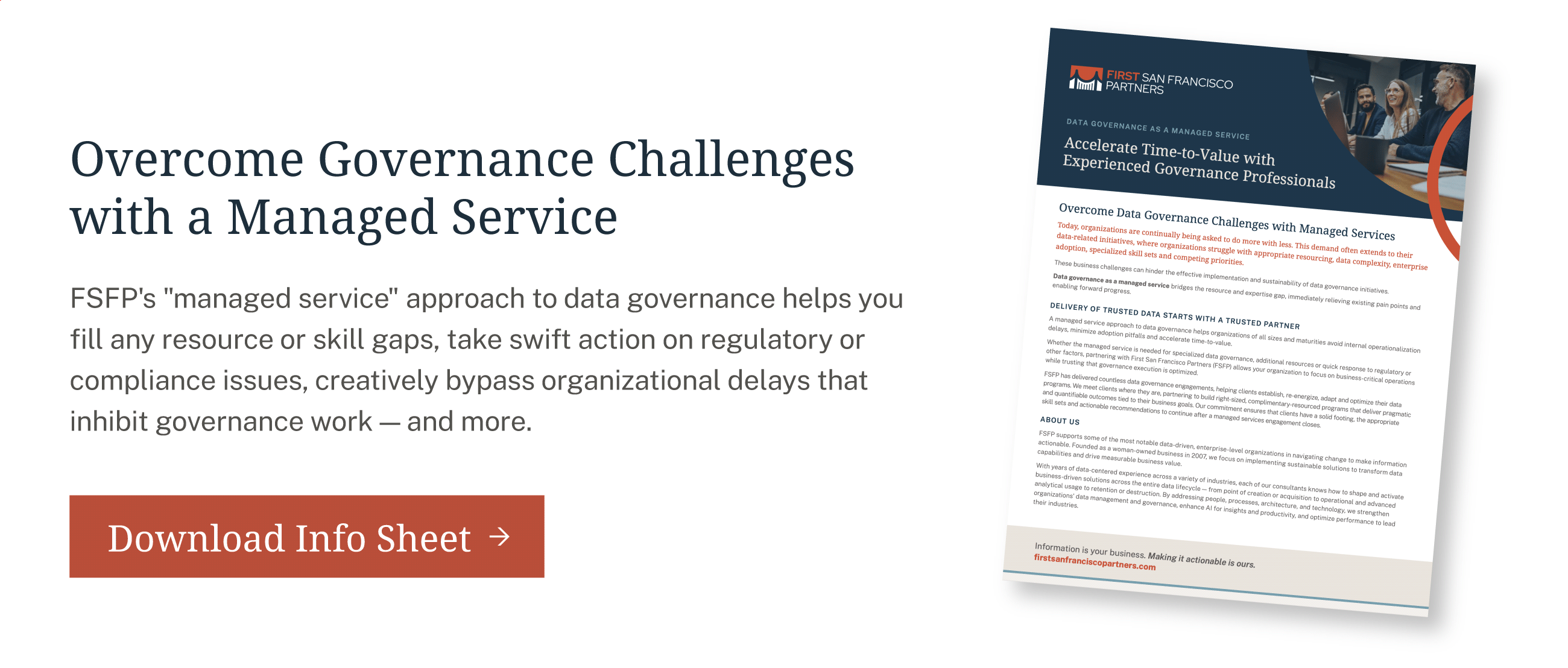It’s football season, and that has us thinking about the elements of a great, winning team. Renowned football coach Vince Lombardi, who knew a lot about success on and off the field, once said: “Individual commitment to a group effort — that is what makes a team work, a company work, a society work, a civilization work.” And we’d like to add — it’s what makes a Data Governance team work, too.
Are you on “Team Data Gov” — that is, are you working on a Data Governance (DG) team? Perhaps you’re a coach, someone charged with building, reorganizing or motivating a governance team. Or maybe you’re in Information Technology, and your partners are on Team DG.
Whatever your interaction with the DG team, you’ll root for players who are committed to governance and those who demonstrate a “we’re on the same team” attitude.
Build Your Team Roster
Let’s assume you’re building or reorganizing Team DG. Your team should include players who are driven to make the right decisions about data. You’ll want people who are able to do the necessary blocking and tackling, identifying the challenges and opportunities with company data.
Focus your recruiting efforts on the people and groups who are already involved in data management. You’ll not only acknowledge their data activities and expertise, you’ll leverage their collective corporate knowledge and ensure organization-wide participation.
Don’t forget to reach out to business areas that may be unfamiliar to you. Find out who is already fulfilling data-related roles and responsibilities. Here are questions to ask those groups:
- Who is creating the data?
- Who is managing the data?
- Who is measuring the data?
- Who is charged with data quality?
- Does anyone have “data” in their title?
Be diligent in finding top talent, as there may be bench players you’re not aware of. They could be people whose title doesn’t represent their data role or someone known in their area for being passionate about the value and integrity of the company’s data.
Check Your Data Strategy Playbook
Conduct a stakeholder analysis, where individuals and groups are mapped according to their level of influence within the organization and level of interest in (i.e., impact by) the transformation of organizational data. This may reveal additional players for Team DG.
After filling your team roster with data champions, check your data strategy playbook once again. Are there open spots yet to fill? Is a key skill set missing from the player lineup? See if there are other positions in the organization where people have analogous, transferable skills that could benefit Team DG.
Compensation and Team Titles Matter
It’s important to consider team members’ compensation and performance objectives — and, sometimes, their job titles — to ensure these align with overall expectations. (If you don’t have managerial responsibilities or influence over some of your team members, promote the alignment benefits with those who do.) Get your players into the right roles with the right responsibilities and incentives, so when they’re on the field, they have the capability, credibility and motivation to make game-changing decisions.
And while it’s tempting to recruit players from outside the league, make sure you fully recognize and recruit the star players from within your organization.
We’re in Overtime Now
There’s more to say about building a winning DG team, and we’re sure to cover this topic again on our blog. In the meantime, check out our How to Choose the Right Data Governance Resources guide that talks about some individual and group roles that support governance programs.
Here’s to a winning season for you and your organization’s Data Governance team!



